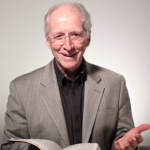 Article by Dr. Steve Lawson (original source here)
Article by Dr. Steve Lawson (original source here)
The sovereignty of God is not a secondary doctrine that is relegated to an obscure corner in the Bible. Rather, this truth is the very bedrock doctrine of all Scripture. This is the Mount Everest of biblical teaching, the towering truth that transcends all theology. From its opening verse, the Bible asserts in no uncertain terms that God is and that God reigns. In other words, He is God—not merely in name, but in full reality. God does as He pleases, when He pleases, where He pleases, how He pleases, and with whom He pleases in saving undeserving sinners. All other doctrines of the Christian faith must be brought into alignment with this keystone truth.
The sovereignty of God is the free exercise of His supreme authority in executing and administrating His eternal purposes. God must be sovereign if He is to be truly God. A god who is not sovereign is not God at all. Such is an imposter, an idol, a mere caricature formed in man’s fallen imagination. A god who is less than fully sovereign is not worthy of our worship, much less our witness. But the Bible proclaims for all to hear that “the Lord reigns” (Ps. 93:1). God is exactly who Scripture declares He is. He is the sovereign Lord of heaven and earth, whose supreme authority is over all. This is the main premise of Scripture.
Nowhere is God’s sovereignty more clearly demonstrated than in His salvation of the lost. God is free to bestow His saving mercy on whom He pleases. God says, “I will be gracious to whom I will be gracious, and will show mercy on whom I will show mercy” (Ex. 33:19b; Rom. 9:15). He is not obligated to extend His grace to any undeserving sinner. If He were to choose to save none, He would remain perfectly just. He might determine to save a few and still be absolutely holy. Or He could choose to save all. But God is sovereign, and that means He is entirely free to bestow His grace however He will—whether on none, few, or all.
From beginning to end, salvation is of God and, ultimately, for God. The apostle Paul writes, “From him and through him and to him are all things” (Rom. 11:36). In this comprehensive verse, God is declared to be the divine source, the determinative means, and the designated end of all things. This is most true in salvation. According to this text, every aspect of the operation of saving grace is God-initiated, God-directed, and God-glorifying. Every dimension of salvation is from Him, through Him, and to Him. This is to say, salvation originates from His sovereign will, proceeds through His sovereign activity, and leads to His sovereign glory.

